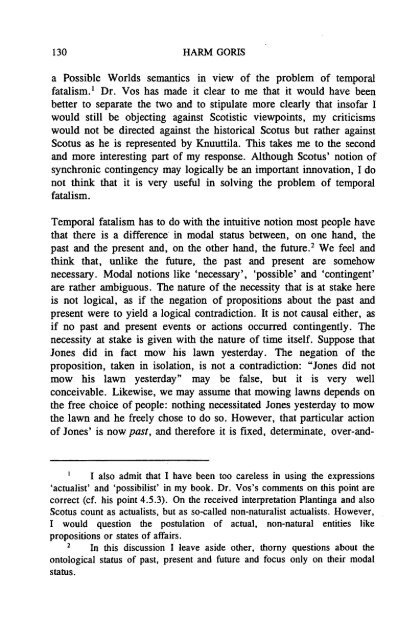Jaarboek Thomas Instituut 1997 - Thomas Instituut te Utrecht
Jaarboek Thomas Instituut 1997 - Thomas Instituut te Utrecht
Jaarboek Thomas Instituut 1997 - Thomas Instituut te Utrecht
Create successful ePaper yourself
Turn your PDF publications into a flip-book with our unique Google optimized e-Paper software.
130 HARM GORIS<br />
a Possible Worlds semantics in view of the problem of <strong>te</strong>mporal<br />
fatalism.' Dr. Vos has made it clear to me that it would have been<br />
bet<strong>te</strong>r to separa<strong>te</strong> the two and to stipula<strong>te</strong> more clearly that insofar I<br />
would still be objecting against Scotistic viewpoints, my criticisms<br />
would not be direc<strong>te</strong>d against the historical Scotus but rather against<br />
Scotus as he is represen<strong>te</strong>d by Knuuttila. This takes me to the second<br />
and more in<strong>te</strong>resting part of my response. Although Scotus' notion of<br />
synchronic contingency may logically be an important innovation, I do<br />
not think that it is very useful in solving the problem of <strong>te</strong>mporal<br />
fatalism.<br />
Temporal fatalism has to do with the intuitive notion most people have<br />
that there is a difference in modal status between, on one hand, the<br />
past and the present and, on the other hand, the future.? We feel and<br />
think that, unlike the future, the past and present are somehow<br />
necessary. Modal notions like 'necessary', 'possible' and 'contingent'<br />
are rather ambiguous. The nature of the necessity that is at stake here<br />
is not logical, as if the negation of propositions about the past and<br />
present were to yield a logical contradiction. It is not causal either, as<br />
if no past and present events or actions occurred contingently. The<br />
necessity at stake is given with the nature of time itself. Suppose that<br />
Jones did in fact mow his lawn yes<strong>te</strong>rday. The negation of the<br />
proposition, taken in isolation, is not a contradiction: "Jones did not<br />
mow his lawn yes<strong>te</strong>rday" may be false, but it is very well<br />
conceivable. Likewise, we may assume that mowing lawns depends on<br />
the free choice of people: nothing necessita<strong>te</strong>d Jones yes<strong>te</strong>rday to mow<br />
the lawn and he freely chose to do so. However, that particular action<br />
of Jones' is now past, and therefore it is fixed, de<strong>te</strong>rmina<strong>te</strong>, over-and-<br />
I also admit that I have been too careless in using the expressions<br />
'actualist' and 'possibilist' in my book. Dr. Vos's comments on this point are<br />
correct (cf. his point 4.5.3). On the received in<strong>te</strong>rpretation Plantinga and also<br />
Scotus count as actualists, but as so-called non-naturalist actualists. However,<br />
I would question the postulation of actual, non-natural entities like<br />
propositions or sta<strong>te</strong>s of affairs.<br />
2 In this discussion I leave aside other, thorny questions about the<br />
ontological status of past, present and future and focus only on their modal<br />
status.








